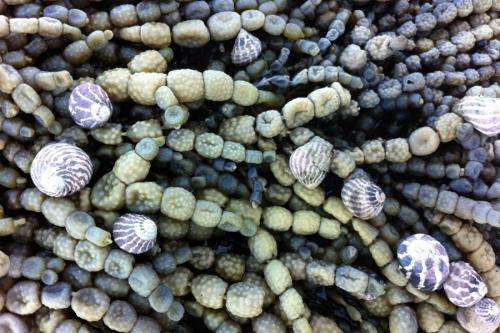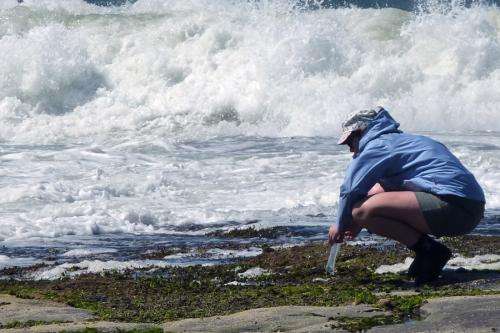New research suggests seaweed species may adapt to higher temperatures

(Phys.org) —Breakthrough research has shown a species of marine algae commonly found along Australia's rocky shores may be able to adapt to increasing air and seawater temperatures, providing insight into the impacts of global warming on the future biodiversity of Australia's coastlines.
The ability of Hormosira banksii, commonly known as Neptune's necklace, to tolerate higher temperatures suggests that this habitat-forming alga has an intrinsic capacity to cope with climate change.
Born in Canada, Jennifer Clark never imagined she would spend her winter hours clambering around the wave-exposed rocky shores of Bilgola and Pearl Beaches to collect adult specimens of Australian seaweed.
Overcoming the challenges has paid off for the UTS Plant Functional Biology and Climate Change Cluster (C3) PhD candidate however, with her research – supported by the Sydney Institute of Marine Science – recently published in the Journal of Phycology.
It is the first study of a marine alga that shows the offspring from different parents respond differently to elevated temperatures.
"Studies clearly show that global ocean temperatures are rising but we have little understanding of the capacity for marine organisms to adapt to the predicted long term increases in temperature," Ms Clark said.

"Hormosira banksii makes an excellent model for examining the potential for marine organisms to adapt because it is an important intertidal species in Australia and New Zealand, providing habitat for many other species.
"These macroalgae cling to rock platforms and don't have much ability to disperse, limiting the genetic diversity amongst populations. It was therefore assumed, until now, that they wouldn't be able to adapt to changes in climate as they can't move to avoid temperature changes and they are already living close to their thermal tolerances," she said.
However, the research of Ms Clark and her C3 colleagues showed that temperature tolerance in this habitat-forming species can be passed on to the next generation, meaning they have the potential to adapt to rising temperatures.
New plants may therefore be less sensitive to heat waves during the summer, or high temperature events during other seasons, giving the researchers some optimism that this iconic species will remain prominent on our rocky shores.
Future research will target whether high temperature tolerance is traded off with other characteristics that help Neptune's necklace survive other types of stress.
More information: Clark, J. et al. Potential for adaptation in response to thermal stress in an intertidal macroalga, Journal of Phycology. onlinelibrary.wiley.com/doi/10 … 1/jpy.12067/abstract
Journal information: Journal of Phycology
Provided by University of Technology, Sydney
















